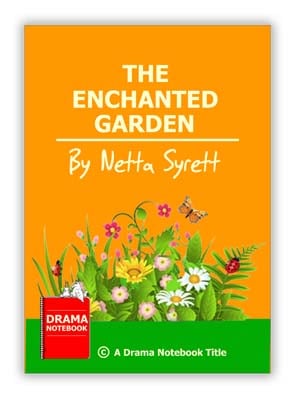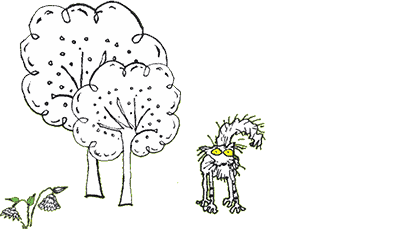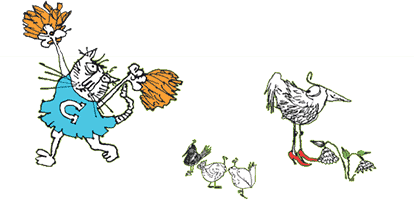10-11 characters, flexible casting, approximately 10 minutes long. A young girl wakes up in an enchanted garden. Is it real, or is it her imagination?
Do characters come to life in this enchanted garden, or is it just the imagination of a young girl? First written in the early 1900’s, this sweet Victorian play was inspired by the book, “The Fairy Doll and Other Plays for Children.” Filled with poetry, flowers, and fairies, this is the perfect play for a mostly-girl cast.
About the Playwright:
Netta Syrett (1865-1943) was an English author who wrote during the late Victorian period. She often wrote about young women rebelling against their rigid, conservative families. She came from a family who valued education and attended the Training College for Women Teachers at Cambridge.
Excerpt from the play:
CHARACTERS:
Nancy
Cynthia (her doll) (Nancy speaks for the doll although it could be played by an actor)
Lubin (Shepherd)
Amaryllis (Shepherdess)
Six Daisies
Cupid
Scene: An old-fashioned garden. Enter Nancy, a little girl of seven or eight. She has a doll under one arm and a book under the other. She seats herself, puts her doll in the corner of the bench, and begins to talk to it.
NANCY:
Sit there, Cynthia, and talk to me. You’ve got a silly expression today—just like Jane when she pretends not to hear a word Mother says to her. And you know you do hear, perfectly well. Are you listening? (She makes the doll speak in a hurt voice.)
CYNTHIA:
Yes. But don’t be cross with me!
NANCY:
(Embracing her.) No, darling! Mother won’t be cross with her dear Cynthia. There! That’s right. Now you look a bright, intelligent child—like I have to look when I go to see Aunt Sophie. Now listen, Cynthia! I want to tell you something. (Impressively.) It’s a great secret. You won’t tell anyone, will you?
CYNTHIA:
May I tell Mademoiselle?
NANCY:
(Shaking her violently.) Certainly not! Do try to have a little sense, child! Not anyone! And especially not Mademoiselle. Do you understand? . . . Very well! Now there’s nothing to cry about. I shan’t tell you if you cry. . . . That’s right. Now listen. (Very impressively.) I’m quite sure this is an enchanted garden?
CYNTHIA:
Oh, Mother! Why?
NANCY:
(With a matronly manner.) You may well ask, my child! (Relapsing into her own voice.) Because I had a lovely dream about it last night. I dreamt that all the people I want to be real people came into this garden and were real people. . . .Now don’t pretend you don’t know what I mean, Cynthia! You know quite well! There’s the little painted boy and girl on the teapot in the drawing room cabinet, and the flower fairies in that book Uncle Jack gave me, and the statue of the dear little blind boy with the bow and arrows in Uncle Jack’s library. You remember it?
CYNTHIA:
Yes, Mother.
NANCY:
Well! I dreamt it quite plainly. And they all came here because they said this was an enchanted garden. And (looking round.) I believe it is! (With a sigh.) Oh, Cynthia! It’s such a sleepy day, isn’t it? And I’ve got my poetry to learn. (She yawns.) But I know some of it. Mademoiselle said I might choose a piece (opens book, and points), and I’ve chosen this. You shall hear me as far as I know. (Puts book on doll’s lap.) There now! Hold it properly. And don’t stop me for the “and’s” and “the’s” like Mademoiselle generally does. It’s so worrying.
(Folds her hands and begins.)
If we believed in fairies still,
The fairies would be there;
It’s only when we laugh at them
They are not anywhere.
Directly we are sure they’re true,
They all come back and play,
In woods, in gardens, and in fields
We see them every day.
But if we say they are not there,
Of course they go away,
It’s just what you and I would do
If we weren’t asked to stay.
They think it’s rude, and so it is.
My garden shall be free
To anyone from Fairyland
Who wants to play with me.
I don’t think I know the last verse. (Yawns.) If I should—
Tell me, Cynthia!
If I—
(Her eyes close; she sinks back against the bench, asleep.)
(Faint music. Enter right and left a little Dresden shepherd and shepherdess. They seat themselves in china-figure attitudes one on each arm of the bench, upon which Nancy is sleeping. The boy puts his pipe to his lips (music continues). Nancy begins to rouse, rubbing her eyes. Presently she sits upright and looks from one figure to the other. Then she smiles and claps her hands. Both figures remain very still.)
NANCY:
I knew it was an enchanted garden! You are the little boy and girl on the teapot! Now where do you really live?
LUBIN:
In the Porcelain Country.
NANCY:
Is it nice there?
AMARYLLIS:
Not very. You have to be so careful.
LUBIN:
You see, at any moment it might smash to atoms.
NANCY:
That’s how you’ve learnt to sit so still, I suppose? I’m rather glad I don’t live there. I should be broken by this time, shouldn’t I?
AMARYLLIS:
Into a thousand pieces!
NANCY:
(Eagerly.) But do tell me what you’re saying to one another when you sit on the teapot. I’ve always longed to know.
LUBIN:
We’ll do it if you like, but (to shepherdess) we’re awfully tired of it, aren’t we?
AMARYLLIS:
Awfully.
LUBIN:
(With a sigh.) Come along! (They get down from the arms of the bench very carefully, as though afraid of breaking. The boy kneels before the shepherdess, who turns coyly away in a Dresden-china attitude. Faint music. Lubin says or sings)
LUBIN:
Amaryllis, fair and sweet,
See your Lubin at your feet.
Do not scorn your silly swain
Stung by Cupid’s dart again.
(To Nancy.)
Shepherds have to play this game,
It’s very boring all the same.
AMARYLLIS:
Lubin, are you sure you’re true?
Can Amaryllis trust in you?
Swains who have been hurt before
Cupid teases o’er and o’er
(To Nancy)
Shepherdesses have to say
Stupid things like this all day.
LUBIN:
(Lubin springs up.)
Here, we are not China toys,
We can just be girls and boys!
AMARYLLIS:
Oh, we’ve forgotten our dance!
LUBIN:
(Wearily.) Come along! (They dance a gavotte.)
LUBIN:
(To Nancy.) We always forget we needn’t be careful here.
AMARYLLIS:
No, here we can run and jump on real green grass, and pick real roses, and play with real lambs—not horrid knobbly China ones!
NANCY:
Do you often come here? People never see you.
LUBIN:
No, that’s because they’re silly, and don’t believe in us. Why, every fine day the
garden’s full of us. (Carelessly.) Here come the Daisies. They’re not bad to play with. (Enter right, skipping and dancing, six little daisy-fairies.)
Why Subscribe?
 Inside Drama Notebook, you will find a huge collection of well-organized lesson plans, scripts for kids, drama activities, 50 drama games on video and more! Join today and dramatically reduce your planning time while delivering fresh, innovative drama lessons to your students! If you are new to teaching drama, this site will be a Godsend! You will immediately feel confident about teaching drama like an expert. The site guides you step-by-step and provides you with materials that you can use right away with your students.
Inside Drama Notebook, you will find a huge collection of well-organized lesson plans, scripts for kids, drama activities, 50 drama games on video and more! Join today and dramatically reduce your planning time while delivering fresh, innovative drama lessons to your students! If you are new to teaching drama, this site will be a Godsend! You will immediately feel confident about teaching drama like an expert. The site guides you step-by-step and provides you with materials that you can use right away with your students.
If you have been teaching for years, Drama Notebook will inspire you with a fresh new approach and innovative ideas!
The site is packed with original, innovative lessons and activities that you will not find anywhere else—and new materials are added monthly.
This site is protected by reCAPTCHA and the Google Privacy Policy and Terms of Service apply.
















